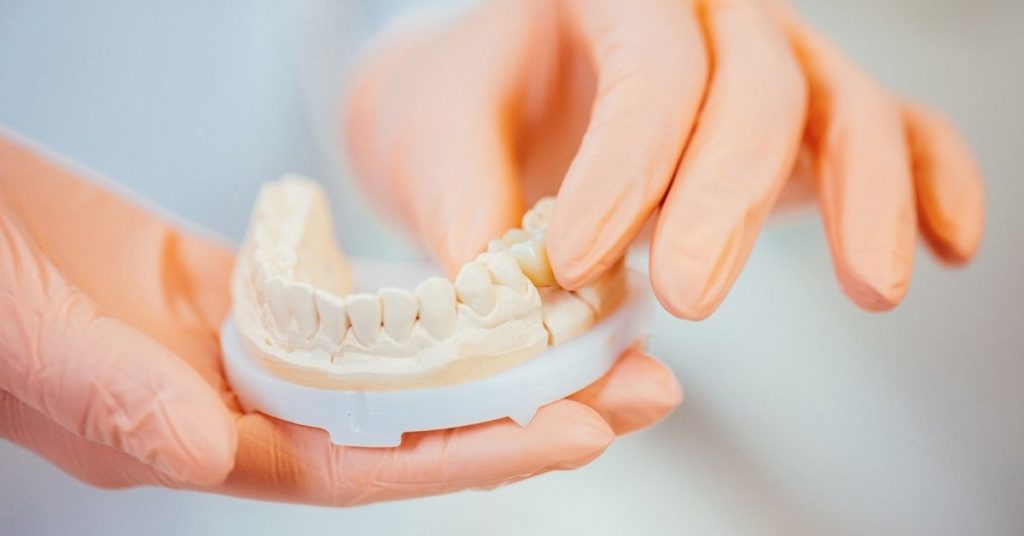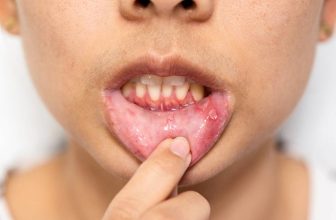How can we make a loose lower denture fit better?
A few things to consider when getting a tighter fit with your denture. The root cause of the problem is often that the denture is not sitting correctly in the mouth. This can be due to incorrect sizing, ill-fitting, or missing teeth.
Sometimes, a complete removable lower denture may be the best option. For others, it may be necessary to adjust the denture or use dental adhesives to help keep it in place.
The common symptoms of a loose denture are:

1. Pain while eating
If your denture is loose, it will rub against your gums and cause pain. This can make eating very uncomfortable.
2. Difficulty speaking
Loose dentures can make it difficult to enunciate your words correctly. This can lead to a lot of frustration for you and the people you’re trying to communicate with.
3. Slipping
Loose dentures constantly slip out of place, which can be embarrassing and frustrating. Additionally, this can make it difficult to eat and speak properly.
4. Gum soreness
Loose dentures irritate your gums, causing them to become sore and inflamed. This can be very painful and makes wearing your denture very uncomfortable.
5. Difficulty chewing
Since loose dentures slip out of place, it cannot be easy to chew correctly.
This can lead to digestive problems and make it hard to get the nutrition you need.
If you’re experiencing any of these symptoms, you must see your dentist immediately. They will be able to adjust your denture so that it fits more snugly and doesn’t cause you any discomfort.
How to Fix Loose Lower Dentures

There are a few ways to fix loose lower dentures. One way is to use a denture adhesive. Another way is to use a retainer or splint. A retainer is a device used to keep the denture in place. A splint is a device that is used to stabilize the denture.
1. Use a retainer
One way to use a retainer or splint is to make an impression on the mouth. The impression will be sent to a lab, and they will make a retainer or splint that fits the mouth perfectly. Another way to use a retainer or splint is to buy one from a store. There are many different types of retainers and splints available.
The best way to find out which type of retainer or splint is right for you is to talk to your dentist. Your dentist can help you choose the right kind of retainer or splint, and they can also show you how to use it correctly.
2. Remake the denture
Another way to fix loose lower dentures is to remake their denture. This option is usually only recommended if the denture is very old or if it does not fit well.
3. Fix the denture yourself
If you have a loose lower denture, there are some things that you can do to try to fix it yourself. One thing that you can do is to use a denture adhesive. Many types of bonds are available, and your dentist can help you choose the right one. Another thing that you can do is to use a retainer or splint. A retainer is a device used to keep the denture in place. A splint is a device that is used to stabilize the denture.
4. Surgical options
If you have a loose lower denture, there are some surgical options that you can choose from. One option is to have implants placed. Implants are metal posts that are placed in the jawbone. The denture is then attached to the implants. Another option is to have a bone graft. This is where new bone is placed in the jawbone. Once the new bone has healed, the denture can be attached.
5. Talk to your dentist
The best way to find out how to fix a loose lower denture is to talk to your dentist. Your dentist will be able to evaluate your situation and recommend the best treatment option for you.
If you have loose lower dentures, don’t worry. There are many different ways to fix them. Talk to your dentist about the best way to improve your loose lower dentures.
Not Enough Gum For Dentures
It’s no secret that having a good set of teeth is essential. Not only does it make you look good, but it also helps with your overall health. That’s why it’s frustrating when you don’t have enough gum to keep your dentures in place.
If you’re having this problem, don’t worry – there are a few things you can do to help. First, make sure you’re chewing gum regularly. This will help stimulate the production of saliva, which will, in turn, help keep your dentures in place.
You can also try using a special adhesive to help keep them in place. Several different brands are available, so you can find one that works best for you. Finally, if all else fails, you may want to consider getting a new set of dentures altogether.
While it can be frustrating to deal with denture problems, there are several ways to solve them. With a bit of patience and perseverance, you’ll be able to find the solution that works best for you.
Can you get dentures if you have no gums?
If you have no gums, you will not be able to get dentures. Dentures require there to be something to hold onto in order to stay in place. Without gums, there is nothing for the dentures to grip on, and they will eventually fall out.
What happens if you don’t have enough bone for dentures?
Your options are limited if you don’t have enough bone for dentures. You may be able to get a partial denture, which uses metal clasps to attach to your remaining teeth. However, this option is not always ideal as the clasps can be visible and uncomfortable. In addition, partial dentures can make eating and speaking difficult. If you’re considering this option, talk to your dentist about whether or not it’s right for you.
Frequently Asked Questions
Can gums recede too much for dentures?
Yes, gums can recede too much for dentures. If your gums have reduced significantly, you may not have enough tissue to support dentures. In this case, you would need to get a gum graft to provide enough support. This is a surgical procedure where tissue is taken from another area of your mouth and grafted onto your gums. It’s a relatively common procedure and can help you get the support you need for dentures.
Can you use super glue for dentures?
Super glue is not recommended for use with dentures. While it may seem like a quick and easy fix, it can cause more problems than it solves. Super glue is not designed to be used in the mouth and can be toxic if swallowed. In addition, it can cause your gums to become irritated and inflamed. Talk to your dentist about other options if you’re having trouble keeping your dentures in place.
What are the consequences of not wearing dentures?
If you don’t wear your dentures, you may experience a number of problems. First, your teeth can begin to shift and become misaligned. This can lead to difficulties with eating and speaking. In addition, your gums can become irritated and inflamed from rubbing against your teeth. Finally, you may also notice a change in your appearance as your face begins to sag without the support of your teeth. If you’re unsure whether or not you should wear dentures, talk to your dentist for advice.
When are dentures not an option?
There are a few cases where dentures may not be an option. First, if you don’t have enough bones to support them, you may not be able to get them. In addition, if your gums have receded significantly, you may not be a candidate for dentures. Finally, if you have a medical condition that affects your mouth, you may also not be able to get them. If you’re unsure whether dentures are fitting for you, talk to your dentist for advice.







